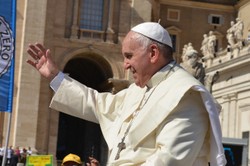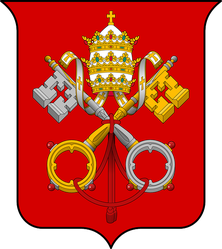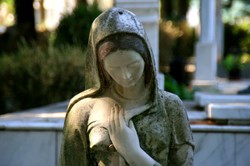Francis hates war of any kind, and, as he is a Jesuit, a member of the religious order , some of whom were missionaries in Hiroshima when the atomic bomb was dropped, he has had the privilege of talking with the survivors and listening to their gruesome accounts of this monstrous blight that befell the city in 1945. He has visited that city as part of his papal visitations, and in this book he spends time attacking nuclear weapons. He is well-informed about other conflicts and the book is therefore able to address conflicts such as Gaza and others.
The pontiff addresses a key point that women and children do not cause wars, but that they are disproportionately represented among their victims. War, says Francis, is a linguistically feminine noun in many languages, but never has a woman's face, implying that war is male initiated.
But Francis has a serious issue with oppressive regimes throughout the world, one of which he personally was forced to endure for years in his homeland, Argentina, when the military junta took over the government, utterly illegally, and ran a fully Fascist regime that oppressed the ordinary people and had a grim record of murder and torture. The Junta persecuted those who worked for the alleviation of poverty. Francis, himself, at times smuggled escapees from the regime by hiding them in his car as he drove out of Argentina. He adds power to his work by detailing the stories of people who underwent persecution, sometimes involving death at the hands of the regime. He writes about the disappearances that have never been solved. He tells us about nuns being drugged and thrown out of an aircraft over the Atlantic.
One piece of information that did not get into the news in Britain is that survivors report that in some instances the rooms in which the atrocities were going on were sometimes adorned with pictures of Adolph Hitler. This demonstrates to readers the source of the Junta's inspiration.
The Pope has scathing words to describe the hypocrisy that passes for peace in modern society. Peace in much modern parlance is a mere lull in hostilities. Francis takes the Christian line that peace arises from converted hearts and minds and restored relationships. He argues that a ban on weapons production for a year could see the elimination of hunger. Idealistic, yes, but true.
He links his opposition to war with his advocacy of responsibility for the environment, damage to which is responsible for much human suffering and which if unaddressed will become worse. This follows on from his papal encyclical, Laudato Sii, on the matter. An encyclical is a letter addressed to the church and the world on an important matter.







 Darkness over the Earth the skies darkened when Jesus was crucified14 days ago
Darkness over the Earth the skies darkened when Jesus was crucified14 days ago
 TheThousand Year Gardenon 11/26/2025
TheThousand Year Gardenon 11/26/2025
 Women of the Gospelson 10/11/2025
Women of the Gospelson 10/11/2025
 Religious Gardenson 08/25/2025
Religious Gardenson 08/25/2025



Comments
There is no rule concerning the precise kind of wood to be used. I suggest that oak would be used for a papal c9ffin, as it is strong and durable.
Online sources identify papal coffins as traditionally one within another within another. So it's a three-coffin resting-place whose materials traditionally involve cypress, lead and oak.
The sources online also mention Pope Francis as maintained within one coffin of zinc-lined, untreated wood.
What tree species would that untreated wood be from?
I do not know the details, but white smoke comes from urning the ballot papers, but the black smoke comes from mixing a contaminant with the papers. What it is I know not.
Thank you for your comment below, in answer to my previous observation and question.
The Jorge Bergoglio papacy as Pope Francis came as a delightful surprise because -- as I've commented elsewhere -- of the Basque saying about an African, a Basque or a Latin American never as pope.
The black smoke describes a delay in deciding whom as pope even as the white smoke designates a pope at last.
What does the Vatican do to develop that smoke as black or white?
No. This behaviour of his seems idiosyncratic. He reminds me of a gentleman who attends my church. While he stays to the end of mass, he concludes by making a slow and almost exaggerated sign of the cross. I think that the gentleman is somewhat autistic. But he has a place in God's church.
Thank you for your comment below, in answer to my previous observation and question.
Yes, the gentleman in question perhaps departs after the first five or six pews empty and refill. He gently, slightly immerses his fingers in the holy water. Then he moves around so that he makes the sign of the Cross with his face and entire front side oriented toward the priest dispensing and the people one-by-one receiving wafer and wine.
It all seems so respectful wanting the holy water even as I most likely always would want wafer and wine.
Wouldn't British-Isles-ers perhaps almost always if not always want their Mass to work out likewise too?
If he stays for some of communion he has attended mass. To have attended mass you need to attend offertory, consecration and communion. It is known behaviour, but not. very common...
Thank you for your comment below, in answer to my previous observation and question.
It's particularly an older gentleman who from a rear pew interests himself intensely in the service all the way to the first wafer- and wine-recipients and then is quickly up, over to the holy water and out.
Might that be common, non-existent or rare behavior among British Isles-ers?
No. The Eucharist, wafer and wine, is a sacrament, one of the seven most important channels of God's grace, whereas the touching the holy water is a sacramental, a religious act less significant than a sacrament. It is a reminder of baptism, intended to remind the worshipper of their baptismal promises.
Thank you for your comment below, in answer to my previous observation and question.
Mass behavior intrigues me in two instances, one fictional, the other real-life.
The movie The drop makes Tom Hardy's one-time-murderer character mention his making his confession to the Church priest even as he never mentions any atonement, apart never missing any Church Mass where he never moves from his pew for Wafer and Wine.
The real-life instance regards attendees who refrain from the Wafer and Wine line even as they remain seated -- all the while regarding the Altar -- until all others receive their Communion. They then relinquish their pew for the Holy Water station on the right side of the main exit-door. They touch the Holy Water surface before touching, Crosslike, forehead, heart, shoulders.
Would the above work as something of an alternative to Wafer and Wine?